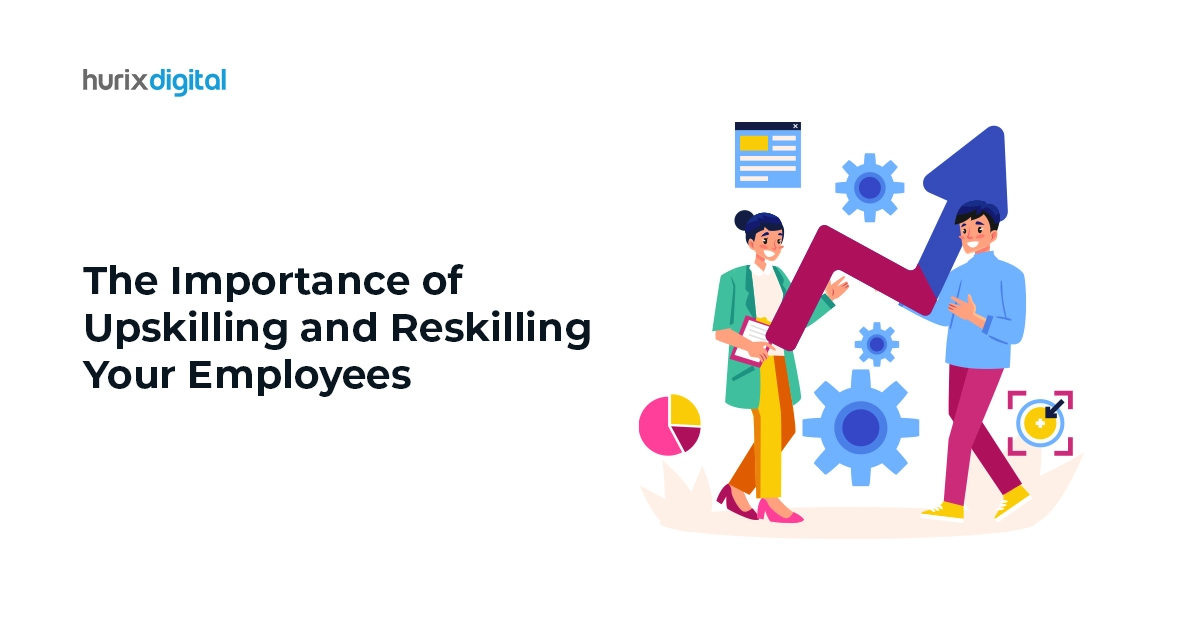
The Importance of Upskilling and Reskilling Your Employees
Summarize with:
In today’s rapidly evolving business landscape, staying competitive requires more than offering quality products and services. Adapting to technological advancements, industry shifts, and evolving skill demands is crucial for long-term success. This is where upskilling and reskilling your workforce come into play.
Investing in employee development through upskilling and reskilling programs isn’t just a buzzword; it’s a strategic investment that offers a multitude of benefits for both employees and organizations. 86% of learners report that accessing learning opportunities at work makes them more likely to stay with their employer.
Let’s take a look at how upskilling and reskilling can positively impact your organization and employees.
Table of Contents:
- Upskilling and Reskilling- At a Glance
- Importance of Upskilling and Reskilling
- Benefits of Upskilling and Reskilling Your Employees
- Building a Culture of Continuous Learning
- Measuring Success
- Wrapping Up
Upskilling and Reskilling- At a Glance
Upskilling refers to enhancing existing skills and knowledge within an employee’s current role. This might involve learning new functionalities of existing software, mastering new marketing tools, or developing deeper expertise in specific areas.
Reskilling empowers employees to take on entirely new challenges, potentially transforming a customer service representative into a software developer or an accountant into a financial analyst.
Also Read: The Importance of Translation and Localization in Workforce Learning
Importance of Upskilling and Reskilling
The dynamic business landscape demands a workforce that is adaptable and constantly evolving. Upskilling and reskilling empower employees with future-proof skills to navigate change, remain competitive, and contribute meaningfully to organizational success.
There are numerous compelling reasons for businesses to embrace upskilling and reskilling initiatives for workplace education:
1. Addressing Future Workforce Training
By proactively upskilling and reskilling employees, organizations can prepare their workforce for future needs, ensuring they have the necessary skill sets to take on emerging roles and responsibilities.
This reduces the need for external recruitment and promotes internal talent development.
2. Boosted Productivity and Performance
Equipping employees with relevant skills and knowledge directly translates to improved efficiency, higher quality work output, and overall organizational performance.
3. Improved Innovation and Adaptability
Corporate learning ensures employees stay updated with industry trends and are better equipped to identify and implement innovative solutions to emerging challenges.
This fosters a culture of adaptability and agility, enabling businesses to navigate unforeseen changes and remain competitive.
Benefits of Upskilling and Reskilling Your Employees
Investing in upskilling and reskilling can empower your employees to reach new heights in their careers while ensuring your organization remains competitive and future-ready.
Let’s take a look at how upskilling and reskilling can positively impact both your employees as well as your organization.
Benefits for Employees
Investing in employee development through upskilling and reskilling programs unlocks numerous benefits for individuals. They gain increased employability, enhanced career growth, and improved adaptability to industry changes.
This fosters job satisfaction, confidence, and a sense of employee empowerment in the workplace.
- Enhanced Career Development: Continuous learning opportunities provide employees with the skills and knowledge necessary to advance their careers within the organization or pursue new opportunities outside the company.
- Increased Job Satisfaction: Feeling valued and supported in their professional growth improves employee morale, engagement, and loyalty.
- Increased Employability: Having a diverse skillset makes employees more marketable and adaptable to future job market demands, offering them career security and peace of mind.
- Personal Growth: Upskilling and reskilling foster a growth mindset and encourage employees to embrace lifelong learning, leading to personal and professional fulfillment.
Benefits for Organizations
By investing in upskilling and reskilling, organizations reap significant gains. They experience increased productivity and innovation, reduced talent shortages, and improved employee learning engagement and retention.
This translates to a competitive advantage, a positive brand image, and ultimately, enhanced financial performance.
- Improved Performance and Productivity: Equipped with the latest skills and knowledge, employees can work more efficiently and effectively, leading to increased productivity and overall business growth.
- Enhanced Innovation and Creativity: By fostering a culture of continuous learning, organizations encourage employees to think outside the box and develop innovative solutions to challenges.
- Reduced Talent Shortage: Investing in your existing workforce minimizes reliance on external recruitment, saving time and resources while reducing the risk of talent gaps.
- Improved Employer Branding: Prioritizing employee development attracts and retains top talent who value opportunities for growth and professional development.
Building a Culture of Continuous Learning
74% of employees have said that the lack of professional development and growth in their current roles has led to the lack of them attaining higher potential.
Implementing successful upskilling and reskilling programs requires a strategic and multifaceted approach:
- Identify Skill Gaps: Regularly assess your workforce’s skillsets and identify areas where upskilling or reskilling is necessary to meet future business goals.
- Develop Tailored Programs: Design professional training programs that cater to the specific needs of individual employees and align with overall company objectives.
- Offer Diverse Learning Formats: Utilize various learning methods, including online learning platforms, workshops, and mentorship programs, to cater to different learning styles and preferences.
- Promote a Growth Mindset: Encourage employees to embrace continuous learning and provide opportunities for them to experiment and learn from their mistakes.
- Recognize and Reward Learning: Acknowledge and celebrate employee achievements in their learning journey to foster motivation and engagement.
Measuring Success
Regularly evaluating the effectiveness of training programs is crucial to ensure they are meeting their intended goals and contributing to improved employee performance and organizational success.
This can involve measuring changes in employee skills, applying learned skills to work tasks, and assessing the impact on key business metrics.
- Track skill acquisition: Monitor employee progress through skill assessments and competency tests to measure the effectiveness of training programs.
- Evaluate the impact on performance: Track key performance indicators (KPIs) such as productivity, customer satisfaction, and error rates to assess the impact of upskilling and reskilling on overall performance.
- Gather feedback: Conduct employee surveys and feedback sessions to gauge the effectiveness of training programs and identify areas for improvement.
Additional Tips:
- Partner with industry leaders and educational institutions to access relevant expertise and resources for your training programs.
- Encourage peer-to-peer learning and knowledge sharing within your organization.
- Foster a learning-centric environment by providing your employees with dedicated time and resources for professional development.
Also Read: 8 Workforce Training Expectations and How to Meet Them
Wrapping Up
By investing in continuous learning, organizations empower their workforce to tap into their full potential, adapt to change, and remain competitive in the long run.
It’s essential to note that building a culture of continuous learning not only benefits your employees but also strengthens your organization’s foundation for future success.
By implementing these strategies and fostering a culture of continuous learning, you can cultivate a skilled, adaptable, and future-proof workforce that drives organizational growth and success.
All set to embark on your upskilling and reskilling journey? Hurix Digital is here to help.
Contact us to explore our comprehensive suite of learning and development solutions designed to equip your workforce with the skills they need to succeed in the ever-evolving digital age.
Summarize with:

Senior Vice President
Julia brings over 20 years of global experience in digital learning and business strategy. She specializes in client success, enterprise learning solutions, and driving growth through innovation, with a focus on AI, VR, and emerging technologies across diverse industry verticals.
 Upcoming Masterclass | Build an Army of Brand Evangelists using Training & Development | November 20th, 8:30 AM PDT | 11:30 AM EDT | 10:00 PM IST
Upcoming Masterclass | Build an Army of Brand Evangelists using Training & Development | November 20th, 8:30 AM PDT | 11:30 AM EDT | 10:00 PM IST

